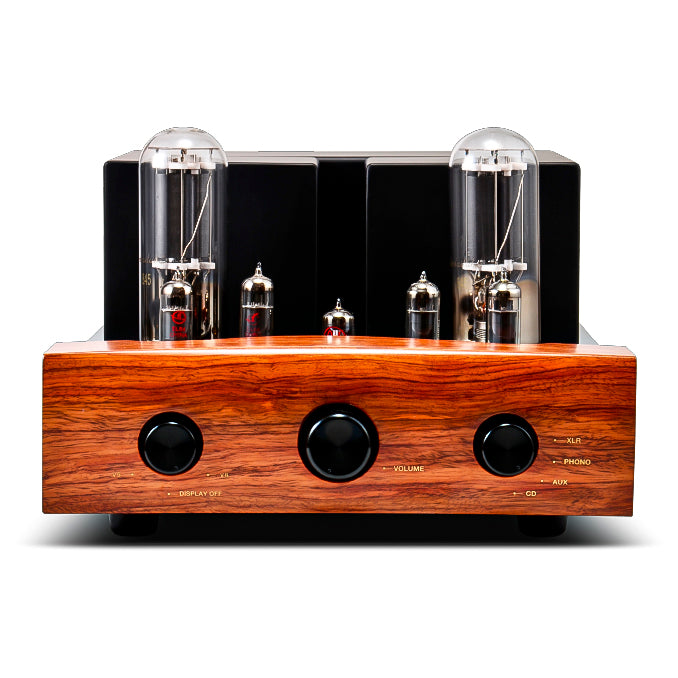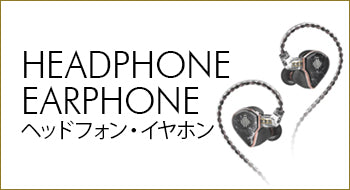It is an audio manufacturer that is handled in our shop. The sound of both amplifiers is a popular manufacturer.
Each appearance is different, from chassis construction to internal circuit and features. The sound that is played also shows the characteristics of each manufacturer, so this time I would like to talk about the differences in characteristics and sounds of each manufacturer from an individual perspective.
Bakoon Products
Bakoon ProductsThe product page is here
https://www.exclusive-audio.jp/shop/products/list.php?category_id=17
This is the only manufacturer that does not use vacuum tubes. It is an audio manufacturer headquartered in Kumamoto that has recently been acclaimed by audio magazines such as MJ. Besides home audio, we also make professional amplifiers and microphones.
what's the feature?Bakoon ProductsSATRI (SATRI) circuit developed independently. With little distortion (EX specification 0.05 %/UL specification 0.007%), it enables ultra-high accuracy amplification.
SATRI-IC, which aims to faithfully reproduce the recorded sound source, has little distortion (distortion rate 0.05% to 0.007%), enabling ultra-high accuracy amplification. Under Mr. Nagai, a developer of celestial skin, the series has evolved to the fourth generation. From the MK4 series, the newly developed HIBIKI circuit was added to further high-definition high-precision sound. The transparency without a single point of cloudiness from high to low range, according to the high SN, stands out due to the very quiet background. Because it is sharp and clear, it conveys the slight movement of the lips of the vocals with delicate background sounds and emotions that can not be heard. No coloring, no decorations, no emphasis on the high and low ranges, reproduces the atmosphere and scenery of the recording site. However, since it is faithful to the sound source, you may want a bit more low range for owners who focus on low frequencies such as heavy bass.
andBakoon ProductsIn other words, SATRI-LINK is a SATRI-LINK connection that uses the current output that sets it apart from other companies along with the SATRI circuit. By connecting the Bakoon device to SATRI-LINK, it is possible to carry a music signal with much more information due to DC high current with little noise than normal connection method (voltage connection). The overwhelming amount of information that is not missing coupled with the SATRI circuit and the music signal with little distortion and noise is the true peak of the Bacoon sound.
On the other hand, it has a high affinity, and the combination with amplifiers made by other companies is not easy to do. If the vacuum tube amplifier is not in the CAP series, there is a space that can enjoy without killing the characteristics of the vacuum tube amplifier used.
The appearance is the place where you like. The contrast between the orange logo and the knob on the black body is actually the same color as the color scheme of the majority of speakers and wooden racks.

Orange knob is a luxury material called bakelite. Chassis uses aluminum. The reason is that the sound is distorted when it is iron, and it is not used because it is high in weight and cost when using copper or shielding with another material to avoid it. Also, aluminum is lightweight and contributes to compactness, so it may be a big advantage that there is no difficulty in installation. Because the transformer uses R-cores and toroidal cores with few leakage flux, the effect of magnetism is not a level of concern. The speaker is also fine. However, the magnetic force of the drive system used by players is strong, so if you put a little distance, or if you put a preamplifier in between, it would be safer to leave it for a little distance.
Astro Electronic Planning
Product page of Astro Electronics Project is here
https://www.exclusive-audio.jp/shop/products/list.php?category_id=18
Audio magazine produces audio equipment centered on vacuum tube amplifiers that are highly rated for their robust chassis making and sound.
The characteristic of Astro Electronics is the robust chassis making. The upper model adopts 2mm or 3mm thick folded stainless steel (made of duralumin for medium-sized models), and it is a high grade with a higher purity than the one used in the high stainless steel cutlery, and the touch of the touch is lightly exceeds familiar tableware. This chassis alone is also considerable weight. The inside is further reinforced with stainless steel or oxygen-free copper. The exterior finished with a mirror surface with few seams and rivets is solid and cold, but it shows high perfection. The appearance of the gentle lights of the vacuum tube under the warm-colored light makes a very atmosphere.
All models are common and the front panel is made of 10mm ultra-thick aluminum plate to reinforce the whole housing and design of Astro electronic products.Bakoon ProductsThe heavy and gutsy enhanced chassis, which did not choose, brilliantly shut out the vibration and noise. The vacuum tube has a double structure with heat dissipation and vibration control. Since the power amplifier has a left and right independent volume, it is useful for a little balance adjustment, and it is possible to listen to music if it is not a record without preamp.

The transformer is made by Hashimoto Electronics, and uses custom-made products designated by Astro Electronics. Almost all the assembly work is done by a veteran amplifier, so the material used is different, but the quality of the product is the same regardless of the price, so the cheap model can not be quite a bargain. The sound created from the well-thought and kneaded chassis, excellent transformers and large capacitors is not related to the warmth and softness of the image of the vacuum tube amplifier. Transparent sound with high transparency. The sound image is solid, three-dimensional, and the middle and low areas are rich and there is room. The mid-level preamplifier enhances high range growth, clear contours, and rich musical expression throughout. Because the basic sound is true to the original sound source, it may feel clear and cool sound as a vacuum tube amplifier, but the sound source is clear, powerful and expressive rich in detail.
Astro Electronics Project uses 12AU7, 12AX7 for the amplification tube, 300B for the output tube, and 12AU7 for the amplification tube, but the reason is that the sound is good, but it is also compatible and widely available and easy to obtain. As you know, even if the vacuum tube is the same model number, the sound is different if the manufacturer is different. I choose a ball that is easy to get so that you can easily change the taste of the owner and the compatible vacuum tube and enjoy music. Therefore, except for some high-end systems, all can be replaced without bias adjustment.Yamamoto Sound CraftIt is a slightly different approach than an amplifier that uses a vacuum tube that you can't get easily like.
Yamamoto Sound Craft
Yamamoto Sound CraftThe product page is here
https://www.exclusive-audio.jp/shop/products/list.php?category_id=13
Expanding various audio accessoriesYamamoto Sound CraftYamamoto Acoustic Amplifier is a combination of wood and brass with beautiful natural wood grain made using excellent woodworking technology. The wooden chassis, which smoothly processed the surface and the curves beautifully, is a woodwork that people have been familiar with since they were little, and the presence of the amplifier of Yamamoto acoustics is enhanced, and the appearance satisfaction is quite high. The charm of wood is a strange thing, and people always want to touch any wooden product and try it.
The use of cherry blossoms and ebony, which have good resonance, is expected to contribute to sound quality, as well as the vibration control effect due to moderate hardness and flexibility. We improve reliability and sound quality by adopting carefully selected parts, such as original products of Yamamoto Acoustics and original processed capacitors, both in Japan and overseas. We also provide non-magnetic brass cover and insulation measures with teflon material.
Yamamoto Sound CraftBy adopting certain vintage tubes, such as Western Electronic and Emission Lab, in the vacuum tube used, we create a dedicated amplifier that enjoys music that maximizes the appeal of the vacuum tube. It can be said that it is for those who want to enjoy music as much as you want with the vintage tube of longing. Another way to enjoy Astro Electronics is to increase the owner's taste and freedom by using vacuum tubes that are easy to obtain.
Yamamoto Sound CraftThe impression of the sound is as it looks like a wooden soft, soft and gentle compared to the above two manufacturers, somehow you can feel the warmth of a vacuum tube amplifier. It can be said that it leaves a vacuum tube. It is a feeling of seasoning the sound in a good sense while properly deriving the personality of the vintage tube used. All power amplifiers are single type. There is a proper contour in the softness, there is no ambiguity. It expresses a single and delicate sound. It is a rich musical expression mainly in the high middle area, but the low area is a little adult. Since it is a single amplifier, the output is not several watts. If you want to fully enjoy the sound, a speaker with high efficiency is ideal.
Yoshishiba Acoustics Industry
The product page of Yoshishiba Acoustics is here
https://www.exclusive-audio.jp/shop/products/list.php?category_id=42
Mr. Yoshishiba, who is the executive chairman of the vacuum tube audio fair held every year in Akihabara, is the representative Yoshishiba Acoustics. It may be the most unique of the four companies. The amplifier of Yoshishiba acoustics has no so-called brand design (design) and there is no sense of unity. The common point is nostalgia and retro feeling. Each amplifier created by Mr. Yoshishiba has a unique design. Mr. Yoshishiba's artisanal qualities like artists are reflected in the design.
It is the same for sound making, and it is as if the way of thinking is different from the manufacturer that faithfully reproduces the modern original sound source. The sound of the amplifier that I longed for in the past was better than the present era. After all, I want to give out the low range comfortably, and I always think about how to listen to music comfortably and how to immerse in a lot of emotion I am working on research to improve the sound quality of day and night amplifiers. Especially if it is a single amplifier or a mono amplifier, the middle and low range is firmly out and listening, and the sound that appeals to the emotion is emitted. The liver that creates the sound is a trance of Yoshishiba sound original. It is a hand-rolled transformer that takes time and effort to reach by trial and error. It is a state-of-the-art technology that is constantly researching with greed and experience to create the ideal sound.
Yoshishiba Acoustics is strongly aware of the sound of European and American amplifiers. I feel that the sound of a long-established Western vacuum tube amplifier manufacturer is different from that of a Japanese vacuum tube amplifier, and I thoroughly examine the amplifiers such as Western from wiring diagrams and components to produce sound that exceeds that, comparing and researching, and utilizing the sound of Yoshishiba acoustics.
It is a way of thinking and approach to the sound of four companies four.
































